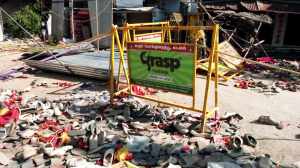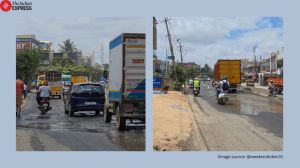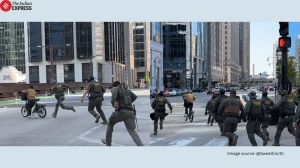Colombia frees Betancourt, 14 others from rebels
Colombian commandos in disguise spirited 15 hostages to freedom on Wednesday, including Ingrid Betancourt...

Colombian commandos in disguise spirited 15 hostages to freedom on Wednesday, including Ingrid Betancourt, a French-Colombian politician held for six years, and three American military contractors.
“I never expected to get out of there alive,” said Betancourt, 46, her voice sounding frail, but charged with excitement, in comments broadcast on the radio.
On Colombian television, Betancourt wept and smiled as she recounted a chain of events that seemed scripted for film, complete with Colombian agents infiltrating guerrilla camps and borrowing Israeli tracking technology to zero in on their target.
The helicopters landed in the jungle at dawn, carrying personnel whom she presumed were part of a humanitarian mission to transport the hostages elsewhere, according to Colombian press reports. The captives were handcuffed and “humiliated,” then put on the helicopters accompanied by two guerrillas who were guarding them, Betancourt explained.
But when she saw crew members wearing T-shirts emblazoned with images of Che Guevara, she thought the hostages had been deceived. “I thought, this is FARC,” she said on television, referring to the rebel group that held her.
Once the doors of the helicopter closed, the guerrillas were subdued, and Betancourt said her handcuffs were removed and the crew told the 15 captives they were free. She said she looked down at one of the men who had been her captor. “I saw him on the floor,” she said. “I did not feel happiness, but what a shame.”
In Bogotá, after a joyful reunion with her mother, she thanked the military for an “impeccable operation.” She looked healthy, especially in light of reports that she had been despondent recently and images showing her thin and distraught in a video captured from the Revolutionary Armed Forces of Colombia, or FARC.
Taken captive in 2002 while she campaigned quixotically for the presidency, Betancourt, over her years as a hostage, became a symbol of suffering, courage and endurance.
The rescue was a major victory in Colombia’s struggle with the FARC, a Marxist-inspired insurgency that has been trying to topple the Colombian government for more than four decades. Colombia’s defence minister, Juan Manuel Santos, said the captives, who also included 11 former members of Colombia’s security forces, were removed from the jungle on Wednesday by an elite commando unit in Guaviare after Colombian intelligence operatives infiltrated the FARC’s seven-member secretariat.
The United States was involved in the planning of the operation and provided “specific support,” the White House said. But officials there would not describe the nature of that support.
The three Americans, Marc Gonsalves, Keith Stansell and Thomas Howes, were captured in 2003 while working for the Northrop Grumman Corporation after their surveillance plane went down on an antinarcotics mission for the Pentagon. After they were freed they went on a military plane to San Antonio, to be taken to a military hospital at Fort Sam Houston.
Betancourt and the Americans were among more than 40 captives used by the FARC to bargain for political concessions. The rescue came during a period of fragmentation in the FARC after the killing and capture of several senior commanders in recent months.
Late on Wednesday night, French president Nicolas Sarkozy appeared on television with Betancourt’s grown children and her sister. “Ingrid is in good health,” Sarkozy said of Betancourt, who holds dual French and Colombian citizenship. “My first words would be to say how happy we are.” He also asked the FARC “to stop this absurd and medieval conflict,” promising to take in all the FARC fighters who renounced violence.
In the operation on Wednesday, Colombia’s military appears to have drawn inspiration from one of the FARC’s own most brazen actions, in which its combatants disguised themselves in 2002 as soldiers and abducted 13 lawmakers in Cali.
Six years later, Colombian agents infiltrated the FARC’s ranks and persuaded a guerrilla commander called Cesar to allow captives held in three groups to be united for a trip by helicopter to southern Colombia.
Betancourt suffered illnesses, pain and indignities during her captivity, but doggedly persisted in trying to escape. Toward the end of her six years as a hostage, Betancourt’s missives to the outside world showed signs of depression.
“I am tired of suffering, of carrying it within me every day, of lying to myself and of seeing that every day is the same hell as the one before,” she wrote in a 2007 letter to her mother, Yolanda Pulecio. In the letter Betancourt said, “These almost six years of captivity have shown me that I’m not as resistant, nor as brave, nor as intelligent, nor as strong as I had thought.”
SIX YEARS AS HOSTAGE
•Feb 23, 2002: French-Colombian politician Ingrid Betancourt is kidnapped along with campaign chief Clara Rojas, by Revolutionary Armed Forces of Colombia, or FARC, while campaigning for president in southern Colombia
•Feb 13, 2003: An aerial counter-drug surveillance flight goes down with Americans Thomas Howes, Marc Gonsalves, Keith Stansell and Thomas Janis on board. Rescue teams find Janis shot to death
•Feb 24, 2003: FARC claims responsibility for bringing down the plane and says it has the Americans
•July 2-22, 2003: Betancourt’s sister, Astrid, and husband Juan Carlos Lecompte, wait in Tabatinga, Brazil for her release. The FARC had told the family it would hand her over because of poor health, Lecompte says. There is no hand-over
•Aug 30, 2003: Colombia’s Noticias Uno shows a video of Betancourt, the first images of her in over a year
•Oct 8, 2003: CBS’ 60 Minutes II shows footage of the Americans urging authorities to negotiate their release and not risk a rescue, saying they would likely die in the attempt
•Aug 16, 2007: Venezuela’s President Hugo Chavez says he is willing to help mediate peace talks between the guerrillas and Colombian President Alvaro Uribe
•Nov 21, 2007: Colombia’s government cancels Chavez’s mediation role after Chavez spoke directly with the head of Colombia’s army, disobeying an order from Uribe
•Nov 30, 2007: Colombian authorities release videos of the three Americans and Betancourt confiscated during a raid on three suspected members of the FARC’s urban militias in Bogota
•Jan 10, 2008: Rojas and former Congresswoman Consuelo Gonzalez are freed and flown to Venezuela
•March 1, 2008: Colombian security forces raid a FARC camp in Ecuador and kill rebel commander Raul Reyes, who had been in contact with the French government over the release of Betancourt
•April 1, 2008: FARC says the cross-border raid on the rebel camp in Ecuador “gravely” harmed efforts to win Betancourt’s release
•July 2, 2008: Colombia announces that its military rescued Betancourt, the three American contractors and 11 other hostages





- 01
- 02
- 03
- 04
- 05


























